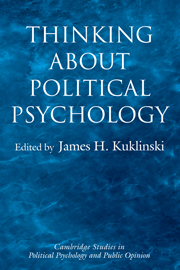Book contents
- Frontmatter
- Contents
- List of Contributors
- Introduction: Political Psychology and the Study of Politics
- Part I Defining Political Psychology
- Part II Theory and Research
- Part III The Psychology–Politics Nexus
- 5 Political Psychology and Political Science
- 6 Is Political Psychology Sufficiently Psychological? Distinguishing Political Psychology from Psychological Political Science
- 7 Political Psychology, Political Behavior, and Politics: Questions of Aggregation, Causal Distance, and Taste
- Part IV Political Psychology and Aggregate Opinion
- Index
- Books in the series
7 - Political Psychology, Political Behavior, and Politics: Questions of Aggregation, Causal Distance, and Taste
Published online by Cambridge University Press: 28 July 2009
- Frontmatter
- Contents
- List of Contributors
- Introduction: Political Psychology and the Study of Politics
- Part I Defining Political Psychology
- Part II Theory and Research
- Part III The Psychology–Politics Nexus
- 5 Political Psychology and Political Science
- 6 Is Political Psychology Sufficiently Psychological? Distinguishing Political Psychology from Psychological Political Science
- 7 Political Psychology, Political Behavior, and Politics: Questions of Aggregation, Causal Distance, and Taste
- Part IV Political Psychology and Aggregate Opinion
- Index
- Books in the series
Summary
The political beliefs, attitudes, and behaviors of ordinary citizens absorb a goodly share of the attention of modern political science. At a guess, they form the subject of as much as a quarter of the articles in the leading journals. Ours is a prosperous subdiscipline. Yet partly perhaps for that reason, partly because every subdiscipline occasions some ennui in other quarters, and partly for reasons we shall explore, it also has critics. Ignoring the egoistic (“it's boring”) and the antiscientific (it deals in generalizations, worse yet in numbers), the most common complaint is that it is insufficiently political.
This is true even – especially? – when the objects of study are such familiar and psychologically macro variables as political sophistication, partisanship, and split-ticket voting – the domain of the field perhaps most commonly known as political behavior. It is also true when they are such less familiar and psychologically more micro variables as reliance on on-line versus memory-based processing, public responses to politicians' blame management strategies, and the use of likability heuristics to locate candidates on issues - the domain of current, cognitively influenced political psychology.
Needless to say, these fields overlap, as the oeuvres of this volume's contributors attest. As a matter of social rather than intellectual structure, political psychology is largely a subfield of political behavior: most political psychologists study mass politics. Perhaps intellectually it should be the other way around, with political behavior (and much of the rest of political science) regarded as applied psychology.
- Type
- Chapter
- Information
- Thinking about Political Psychology , pp. 217 - 250Publisher: Cambridge University PressPrint publication year: 2002
- 16
- Cited by



